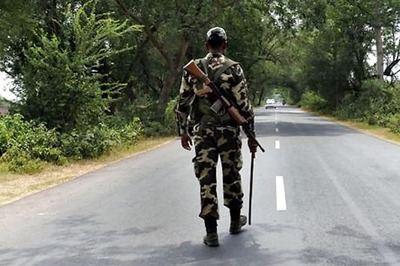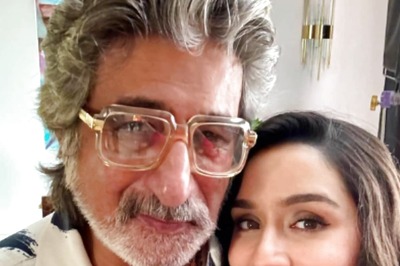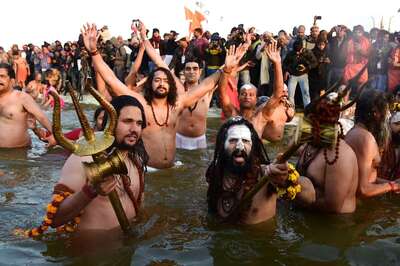
views
Alfred Hitchcock may have said that 'self-plagiarism is style', but it is filmmaker Imtiaz Ali who has proved this point. One of the common allegations that are often leveled against Ali is that he keeps making the same love story again and again. In fact, when he announced his latest film Love Aaj Kal, which also happens to have the title of a film he directed in 2009, the internet erupted with hilarious memes, as many trolls pointed out that this time he hasn't even bothered to name the film differently. Although these allegations are not true, it is not hard to see why many might feel this way.
Ali's visual grammar is the insignia of his movies -- the calm and romance of hills and winding roads in Jab We Met (2007), Highway (2014), and Tamasha (2015), the strikingly large graffiti and wall murals in both the Love Aaj Kal (2009 and 2020) and Tamasha -- and these images reoccur in almost all his films. Moreover, his love stories always have the same elementary themes -- the redemptive power of love, the journeys of self-discovery, the fairy tale of the ordinary. Add to these Rumi-esque yearning, and AR Rahman's soulful musical tracks, and you almost have an Imtiaz Ali romance.
I say 'almost' because Ali's films are always more than the mere sum of their parts, or as Veer (Kartik Aryan) from Love Aaj Kal would put it, 2+ 2 doesn't just make an ordinary 4 in his cinematic universe, which is why despite the texture and form being same in all his films, none of them is remotely similar to one another, except for the two Love Aaj Kal.
The Tamasha Complex
In the new Love Aaj Kal, Ali has borrowed the structure of its 2009 namesake. Much like the previous film, this too is about two love stories separated by time. The love story between Raghu (Kartik Aryan) and Leena (Arushi Sharma) takes place in the 1990s, is narrated in flashbacks, and serves as a guidepost to the 'modern-day romance' unfolding between Veer (also played by Kartik Aryan) and Zoe (Sara Ali Khan) in 2020.
Read: Love Aaj Kal Movie Review: The Only Nice Bits Feature Kartik Aaryan and Newcomer Arushi Sharma
Anyone who has seen the two films will tell you that the new one is far inferior, and that isn't saying much given that the older one, starring Deepika Padukone and Saif Ali Khan was mediocre at best. What makes things worse is that Ali is really off his game in this one, and come off as someone trying to mimic Imtiaz Ali, instead of being Imtiaz Ali himself, and that is the worst kind of self-plagiarism.
The reason for this gradual change in Ali's filmmaking can perhaps be traced back to the polarizing reaction that Tamasha -- one of the finest films he has ever made -- received from the audiences. In a recent interview with Anupama Chopra, Ali said that as a filmmaker, what he aspires to do is to make his stories simpler, rather than telling simple stories. "Ved Vyas wrote Mahabharata. It is such a complicated story, but every scene of it is simple enough for everyone to understand. Kabir, the poet or Rumi, they say such complicated things, but in a simple way, I aspire to be like that," said the filmmaker. He also confessed that when many fans of Tamasha claimed that it was too intellectual for the masses to understand, it irked him. He wanted his films to be accessible and then followed Jab Harry Met Sejal (2017) and of course, the new Love Aaj Kal.
Phrasing moments
Unfortunately, what Ali fails to realise is that the sole reason he could annex Yash Chopra's legacy, and become the gold standard of Bollywood romances is his capacity to phrase moments that beautifully conveyed complex ideas in simple ways.
For instance, in Tamasha, much before the movie delves into Ved's (Ranbir Kapoor) repressed personality issues, the audiences are already clued into it through visual shots -- Ved is often seen in front of mirrors, which denotes the split in his two personas. There is a moment in Rockstar (2011), where Jordan (Ranbir Kapoor) shows his middle finger to a frenzied crowd as cops corral him away. It's a simple scene in a montage that plays along with the song Naadan Parindey. But pay attention to the narrative and you will realise that Jordan is mimicking his music idol Jim Morrison in that scene. In order to become like his idol, Jordon had gone looking for pain, so that he can channel the dard, into his music, and become like Morrison, and as Ali's genius storytelling would have it, he did find the pain, so much so that the fact that he has become like his idol did not bring him satisfaction anymore. In the older Love Aaj Kal, at a secret meeting arranged by friends during Meera's (Deepika Padukone) wedding, Jay (Saif Ali Khan) wonders aloud why Meera never insisted on getting married to him. He rambles along, displaying every unresolved emotion he has towards a love he has not fully processed or understood himself. After he leaves, Meera returns to the mandap to complete the wedding ceremony, but her heart is not there anymore.
In the new Love Aaj Kal, unfortunately, such moments of beauty are very rare. Ali's characters talk incessantly about those larger than life ideas like andar ka janwar, they try to find the place dil aur duniya ke beech, but we never see them transmogrify into those beasts of passion, or truly embark in those journeys of self-discovery. It appears that in order to tell his stories simply, Ali has completely diluted his ideas; the ugliest touch of all are the Rumi quotes mentioned by Veer as Whatsapp forwards, which is somehow supposed to compensate for the poetic charm that his films previously carried. There isn't a single place or character in the film that grounds the movie or give it a sense of realism, and realism is a big part of Ali's romances.
Beyond Modern Love Stories
Although many may claim that Ali has been a brilliant chronicler of modern romances, it has rarely been the case. His love stories work not only because they are contemporary, but also because they carry the same element of timelessness that all beautiful love stories do.
The yearning, waiting, and passion his films manifest are not characteristic of modern love stories at all and have been associated with romances since forever. In Rockstar, for instance, Jordan is the elixir Heer (Nargis Fakhri) needs when her health starts failing, he is the one with the 'magic touch', in Love Aaj Kal Meera decides to end her marriage and wait for Jay (Saif Ali Khan) to realise his feelings for her, and never tries to contact him in the age of Facebook. In Jab We Met, Geet is so shattered when scorned by her boyfriend that she morphs into a shell of her older vibrant self.
With the new Love Aaj Kal though, Ali tried to decipher how millennials fall in love. This was therefore in a way his first attempt at understanding a new kind of love. For a generation that begins relationships with sex, his aim was to understand how intimacy grows emotionally. However, he doesn't venture into the ways in which millennials find love, or how relationship dynamics have changed with changing times in the film at all. He loops back, like a red circle on a wrong answer, to the same old love that is familiar, and that has the life-changing potential of leading to myriads of small and big discoveries about one's self. Not that there is anything wrong with that, except, that it is written horribly, and this time around, the film desperately lacks his 'magic touch'.
Follow @News18Movies for more




















Comments
0 comment